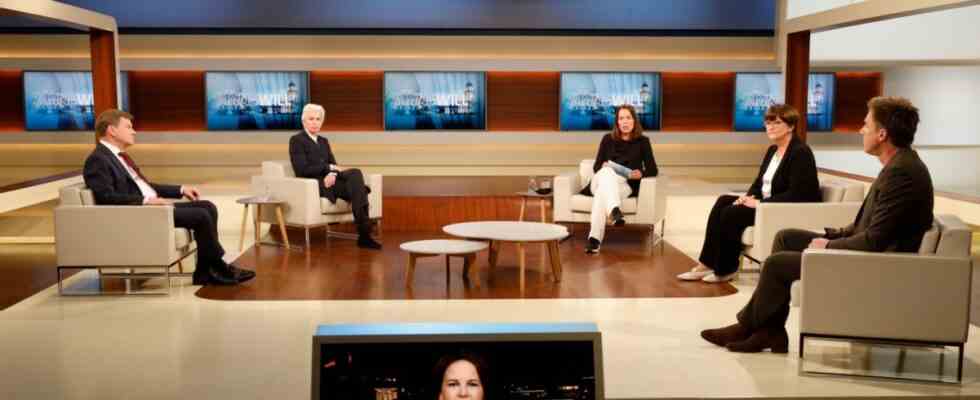If you were to create a ranking based on the least original victims of everyday grumbling, television talk shows would probably come in second place after Deutsche Bahn. Too often the same people sit on the same beige armchairs, too rarely are they women, too often it’s about the same topics, incidences and compulsory vaccination, for example. Everything has been heard before, just not by everyone – but that doesn’t necessarily make it any less true.
A point of criticism that was recently added: the vacation planning of the Talk editors. This became particularly clear in the current French elections. In the week in which it was decided whether a right-wing extremist would lead one of the most important countries in Europe, the public broadcasting studios were mostly on hiatus. Key word: Easter holidays. On the Sunday of the French runoff, ARD did not broadcast any Anne Willinstead they ran daily topics and a Styrian thriller. Also Hard but fair and Maischberger – The week canceled in the same week. Maybrit Illner was back from the Easter break at ZDF, but preferred to talk about the war in Ukraine instead of France.
It is not the first time that the public service talk shows have been criticized for their breaks in broadcasting, the topic also came up last summer when Anne Will, Maybrit Illner and Co. sat out the federal election campaign for several weeks.
With all understanding: Do almost all talk shows really have to pause at the same time?
Now it’s hard to criticize the fact that the Talk editorial staff, who often have to work under high and time pressure, sometimes take a break from broadcasting. Especially with the high number of hits with which the programs are produced and appear in the program, one could carefully ask whether almost all talks really have to be paused at the same time. Especially the public ones, which, hello radio contribution, have a certain social mandate. Why isn’t it always sent when it should be sent?
Anne Will’s production company, Will Media, prefers to speak of “non-transmission weeks” instead of vacation-related “loss”. This year there are 22. Of 52. According to a spokeswoman, these result from the contracts with the NDR, which is responsible for the program within the ARD: “The NDR commissions the production company Will Media with a certain number of programs per year, the broadcast dates are set in advance and distributed sensibly throughout the year, taking into account, for example, holiday periods and major TV events such as the World Cup or the Olympics.” In addition, the editorial team is “always ready and able” to produce a program, even at short notice. From the outset, no broadcast had been commissioned for the two French election Sundays. So is the sender to blame?
The ARD also explains that it is fundamentally possible to deviate from the previously determined broadcast schedule “if it appears to be the appropriate form for current reasons to react to the current news situation”. In the case of the French elections, this was apparently not considered necessary. A spokesman said that the ARD had “intensively and comprehensively mapped out” the election, including in the first. Among other things, he refers to Daily themes extra on election night (six minutes and 43 seconds long), a documentary that ran beforehand, and the current news and magazine programs. From the point of view of the program management, this was “the more appropriate form of informing about the development of the election evening”. In the event of a very close outcome or a victory for Le Pen Hard but fair discussed the outcome of the election the following week. Incidentally, the talk show with Frank Plasberg broadcasts 34 times a year, so there will be a break in 18 weeks.
Content breadth? “Anne Will” discussed Putin for three weeks in a row
The ZDF also refers to the current news programs in relation to the France election Today Journal Special (two minutes and 58 seconds long) and a documentary, also a Markus Lanz-Episode in which the France expert Ronja Kempin discussed. In principle, the dates for talk shows are set by the station’s editor-in-chief and program management in coordination with the respective editorial team. for Maybrit Illner there are 40 this year, for example, which means twelve weeks without the show. The longest break is in the summer.
The question that remains is why the shows that broadcast don’t broaden their content. After all, not a single major public talk show devoted an entire program to the French election. Instead: some Corona, a lot of war in Ukraine. “The presidential election in France was overshadowed by the war in Ukraine,” ZDF said. “Talk shows report on what dominates the current debate and public discourse. These have been the Ukraine war in the past few months and the Corona crisis for two years,” reports ARD.
alone at Anne Will was asked in March for three consecutive weeks: “Putin’s attack – war without end?”, “Attack on Ukraine – how to end Putin’s war?”, “War on Ukraine – how far will Putin go?”. On Monday after the French run-off election, in which Marine Le Pen lost but achieved her best result in history and was elected by an unbelievable 12 million people, Frank Plasberg discussed Hard but fair but rather under the title: “Ukraine is fighting, Germany is hesitating: is our fear of Putin paralyzing us?”
Read all TV reviews here.

